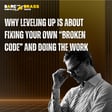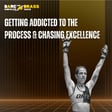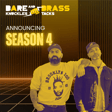Become a Creator today!Start creating today - Share your story with the world!
Start for free
00:00:00
00:00:01

Life After the NFL: Lessons for Identity, Goals, and Team Leadership
Former NFL player Mark LeVoir joins us this week to talk about life after pro sports, and the lessons he took transitioning to a career in tech.
George K and George A talk to Mark about:
- The transition from professional sports to tech sales and why goals beat identity every time
- His simple method for aligning business outcomes with corporate objectives in enterprise deals
- Building sales teams that can fail fast, learn quick, and operate on trust instead of aggressive tactics
- Life lessons from the NFL locker room and why hanging with Tom Brady is just like hanging with regular dudes
"I want my people to be able to fail. Fail fast. What do we learn from it? If your intent's in the right spot and you just failed, it's a coaching experience. If your intent isn't right, we're having a different conversation."
Plus, George A. gets Mark talking about hanging with Tom Brady, why Lamborghinis are useless when you're 6'7", and his top cigar picks, because why not?
------
If there’s a burning topic you think we should address, let us know! Email us at contact@bareknucklespod.com
Transcript
Introduction to Mark Lavoie
00:00:08
Speaker
No, this is Bare Knuckles and Brass Tacks. This is the tech podcast about humans. I'm George K. And I'm George A. And today our guest is Mark Lavoie, who is actually ex-NFL player, used to play for the Pats, go
Career Transition from NFL to Tech Sales
00:00:24
Speaker
Pats.
00:00:24
Speaker
And yeah, he's here to tell us about what a career looks like in tech sales after that, ah I don't know, that it was seemingly peak, career peak, but um Mark reveals a lot more about what's behind the curtain.
00:00:38
Speaker
Yeah. Yeah, it was a really cool episode. um You know, Mark talked about everything from his sales methodology, his approach, how he got into the game as someone who had probably no business in tech or in sales after eight years away from it.
00:00:55
Speaker
um But, you know, you you discovered that he did study comp sci and anthro and university and, and you know, Georgie kind
Episode Highlights and Themes
00:01:02
Speaker
of aligned with that. And um I think getting into the human interest side of it, too. And we talk about everything from you know, cigar types and and what it's like dealing with rich people. And there was a baby oil joke in there at one point. So think it was a pretty fun episode.
00:01:17
Speaker
Yeah, this is a fun one. Let's leave it to Mark. There's a lot to learn. So pay close attention. Mark Lavoie, welcome to the show. How are you doing? Thanks for having me.
Building Connections and Career Journey
00:01:28
Speaker
Awesome. Yeah. So ah full disclosure, ah Mark is a ah recent friend of mine that I made after ah doing a ah podcast for ah my college friend, John, for his company, Cohash, of which Mark works.
00:01:43
Speaker
actually ah runs their operations in the States. But Mark came up to Toronto. ah We had a really good time and that conversation kept going. We had a great time in Vegas. So I thought, well, what the hell? I mean, can't have cool friends not put you on the show.
00:01:57
Speaker
ah So I think I'd like to get the audience a chance to to know you a little bit. So Mark, if you want to kind of talk about your background and how the hell you ended up talking with two fucking nerds. Yeah, no, my background's a little bit, a little bit interesting from,
00:02:11
Speaker
you know hol i got in the tech So obviously played football, went to the University of Notre Dame, Then played in the NFL. But while I was at the University
00:02:29
Speaker
So it's opposite end of the spectrum there. And then played in the NFL. Then when I retired, you know, met a lot of folks in the business world and through charity golf events. I like playing golf.
00:02:45
Speaker
um And one of them, a couple of them used to be you know the head and the president, vice president sales at Intel. So I called actually john Stewart, who I talked to you the other day. He's actually an AMD now.
00:03:00
Speaker
And I just asked him when I had retired, like, Hey, I'd like to get into tech. You know, eight, nine years removed from my graduating class. I didn't get a meeting with most people because I played in the NFL, but how do I sell myself to that?
00:03:16
Speaker
Right. So it's like, yeah, You know, when what I'd say to like younger folks coming out, you know, it's not always about the money, it's about the education.
Starting and Succeeding at SHI
00:03:24
Speaker
And, you know, what John said to me was, hey, you can go come work for me in Atlanta.
00:03:28
Speaker
And was like, I wouldn't like John, not coming to solicit a job. Right. I'm just saying, what's the best way to get in back into tech, knowing that, you know, I'm eight, nine, 10 years almost removed from my graduating class of college and haven't been in the workforce. I've been, you know, playing a professional sport.
00:03:48
Speaker
And, know, he's just like, hey, the best thing to do to get back into tech is to go to like a large account reseller. Right. So I ended up going SHI. He explained to me, he's like, hey, you know, it's a great place to start. They'll train. you out you understand things you can stick and stay there or your true career can just go on you know a different path where you go to an OEM versus a reseller, so on and so forth.
00:04:17
Speaker
So I went to HHI. It wasn't for the money. It was to get know really trained, had some success there, quickly understood nothing against HHI, but they didn't they didn't have like local talent, and all the money was was in the data center at those times before everything pivoted to cloud.
00:04:37
Speaker
So quickly, know, it was awesome. Had some great leaders there and Joel Fikes and such.
Professional Growth in Tech Sales
00:04:43
Speaker
um And then pivoted to a ah local bar where, you know, it was, you know, very entrenched here in the New England Island outside of Boston right now.
00:04:54
Speaker
And pivoted to a local bar where they had a lot of expertise locally and, know, was able to get those larger deals in in the data center. You know, some them, know, like selling, you know, EMC, I'd say my largest storage deal at the time was a 16 petabyte deal with a company here in Seaport of Boston, you know, packing the day.
00:05:22
Speaker
But, you know, then then pivoted there. From there, I kind of was looking for, you know, more professional development. and and such and more of a a mentor, not that the local bar didn't have that, but, you know, so I then pivoted and went to Dun & Bradstreet, worked a role there for a few years doing like master data management and big global, you know, things there, right? So all the master data management and such working with global companies, that was fun.
00:06:00
Speaker
Then had a brief stint at Gartner. Nothing against Gartner. It just wasn't the fit for me. But learned what I didn't like, right? I have nothing bad to say about them.
00:06:11
Speaker
And then, you know, for me, i kind of... You know, I've always naturally sold or had something tangible to sell. Right. And consulting, i knew one of my, you know, I do a lot of self acquisition, like, Hey, how can always improve? Where, where, where are my pitfalls?
00:06:30
Speaker
You know, where do I think I need to improve? And.
00:06:35
Speaker
For me selling something tangible, like, hey, here's a storage array or here's networking switches or so on and so forth, like that's kind of easy. But now all of a sudden you take away, know, it's like going in and buying a new phone like your iPhone. Hey, you want to sell, I always sold services as an oh, by the way, know, hey, you're going in to buy this iPhone for a hundred bucks. It'll take me 10 minutes to merge all your applications that dated to your new phone.
00:06:58
Speaker
George and George, are you guys in? it's The answer is usually yes or yes, right? To, hey, someone saying you, let's go build this iPhone. Right? And it's more abstract and you have nothing to start with. And it's more abstract, you know, concept to me, at least for me, some people might not be.
00:07:16
Speaker
So that's where i took a job with a company called Infor, which is you know now under you know cook industries and really doing global transformation deals and selling services.
00:07:28
Speaker
right And then you know I was there for the last seven and a half, eight years. And then this opportunity to come to where I'm at today Kovach came about to really build the United States market it out and use my creativity. So long-winded answer there, but that's how I got to where I'm at today.
Overcoming Post-Sports Career Challenges
00:07:50
Speaker
Yeah, i think I think it's really cool because, you know, like for someone who has to have such like a range of diversity to go from selling services and then in the non-security sector and then you have to deal with like Cohash, which, you know, because, you know, handling like unstructured data, like petabyte scale is like kind of a really big problem. And it's like at the bleeding edge of stuff. So I think it's really cool that you have like the mental flexibility to kind of figure that out and like,
00:08:17
Speaker
you know It's tough, too. like I got to call it out because a lot of folks, they leave the pros, whether it's football, whether it's basketball, whether it's fighting. And um <unk> it's kind of like the peak of their life and then things kind of go downhill afterwards. But you've like found a way to, I guess, create new opportunities and and and find new things to compete after. And I'm sure like you have a sense of competitiveness that really kind of drives that, right?
00:08:41
Speaker
Yeah, and I think it's just always being goal learning, right? And knowing that, hey, I had a goal when I was a little kid, like a lot of little kids that play professional sports and play professional football.
00:08:52
Speaker
For me, it was never my identity. It was a goal. You know, um maybe could pushed it and played longer, but I was like, i I've checked that box. And then I have goals, you know.
00:09:04
Speaker
personally and professionally and I think if you kind of don't have goals in a drive or a why you know you can kind of just when you're done playing football you lose your identity or a professional sport it's all gone and it's like well why am I here because that's all your focus was on was hey this is what I am and you allow that to be your identity and you know for me i never wanted football to be my identity i just it was a goal its a passion It was fun. It was awesome.
00:09:34
Speaker
But at being I have goals now to build and make way more money and ah in the professional career than i do you know ever playing football Yeah, i well, first of all, fellow anthropology major, game recognizes game. But ah I really like that distinction between goal versus identity.
00:09:57
Speaker
um Psychologically speaking, once something becomes part of your identity, it becomes very hard to unwrap and sort of contort yourself to protect it.
Personal Accountability and Team Dynamics
00:10:06
Speaker
um So that's a very good distinction. I think one of my questions post-NFL career for you – You said self self-actualization, which requires a lot of self-critical thought, awareness.
00:10:20
Speaker
um How did you essentially go from a life where a lot of that goal was maintained and managed by whole teams, nutritionists, coaches, ah physical therapists, whatever, even professional managers and sports agents,
00:10:38
Speaker
to now you are solo and you kind of have to compress a lot of that motivation and technique into yourself. You don't have ah a team to rely on. Could you talk a little bit about that?
00:10:49
Speaker
Yeah, i mean, still in the business world, you have teams, but it's ah' you know it's obviously a little bit different how the nfl NFL locker rooms and how they approach it. There's no real HR, so you have to learn kind of turn it off. But you've got to trust the people you work with, and you've got to empower them, right?
00:11:06
Speaker
And there's fundamentals in sports that translate to you know that translate to the business world. You know, yeah there's there's a lot of same concepts and, and like I said, fundamentals that do translate that you just, you got to have a process and then you just kind of plug and play. I mean, running a business is no different. I mean, I used to talk to executives all the time.
00:11:33
Speaker
You know, CEOs of companies are really good about saying, hey, here's what's my why, but where they fall short in a change management program is how each job function fits into the why.
00:11:44
Speaker
Right? Because you we've all been on an all-hands call. And I think even in coaching or you know one of the things I've learned about in football is just I've had such a vast experience from coaching and management styles where you can kind of take bits and pieces of what's worked. Obviously, you know, i've played for, in you know, the Patriots and Bill Belichick was the best. And there's a reason why he's the best.
00:12:07
Speaker
Right. I mean, he was very good. Everyone, no one's above, you know, the team. And he was very good at laying out what the rules were. what the rules were, and here are the goals and objectives, and here's how you fit into it.
00:12:22
Speaker
You want to expand your role? This is what this is where you're weak, Mark. like you're you know You're not good here in the off season. If you want more playing time, we'll give you the opportunity in practice. You prove it in practice, away you go.
00:12:35
Speaker
And like I'll tell most people in life, You know, when you're when you're out there on the playing field or you know, and in the professional career, if you make your boss look good, you're going to be playing in starting. That's what it comes down to. And you control you.
00:12:50
Speaker
Right? So start with yourself.
Lifestyle Changes Post-NFL
00:12:53
Speaker
And, know you don't you know, my dad always told me when i was younger is, understand what you don't know and surround yourself with people that do.
00:13:03
Speaker
I mean, these all sound very simple and yet we're in this riot of humanity where people self-sabotage or get in their own way. But yeah, I appreciate that answer. Yeah, and i think I think it's kind of cool because, um you know, it's...
00:13:19
Speaker
I think it's important to think about the health aspect of it because, you know, you used to be a much bigger guy, like at your playing weight versus your current weight now. And there's like some real lifestyle changes that kind of come with that when, you know, you're going from workouts professionally all day and a very like set routine schedule in season and off season and OTAs.
00:13:40
Speaker
um You know, I'd like to time and talk about kind of the the the health transitions you've made because you are substantially leaner than your playing days. And then, you know, because you're like six, seven, like you, you look more like ah a super heavyweight fighter than, than a dude who played offensive line. yeah Yeah.
00:14:00
Speaker
Talk about how you made that kind of health transition. Cause I think that's where I know a lot of guys that like played in the NHL up here and, when they're done playing, that's a cardio heavy sport. They, ah they still sometimes like keep eating at that level and they just get same with professional soccer players. Like, Oh my God. yeah The Maradona effect. Yeah. Yes.
00:14:19
Speaker
ah So how how did you manage, like make healthier lifestyle choices? And if talk about like, what do you do now? That's made you so like, I guess still vibrant. Yeah. i mean, I think, you know, when you go into the facility and everything, like everything's kind of mapped out for you right so then when you leave you know and it's it's the easy button right so you walk into the facility you have people making you know omelets for you for breakfast or you have a certain car or meal plan where it's like hey go down the buffet line you know and if you want something made fresh they'll do it and you just grab whatever you want all the snacks pre and post workout meals are there you know post practice you know all those things are provided so you don't have to think
00:15:04
Speaker
right and you know it's just like hey this is what you're doing. This is what, you know, so on and so forth. And then when you get out, it's kind of like the wild, wild west. And you're just like, well, yeah, I'm not, you know, practicing for four hours a day and then watching film and then working out and and all those things.
00:15:22
Speaker
And, you know, for me, was just like, it was always a goal to get down in weight. And, and especially, you know, we, we travel a lot and I travel a lot for, for my job.
00:15:35
Speaker
You just got to, what I would tell people is you just got to get out of the vicious cycle the bad habits and you got to focus and commit to about a week. And then once you understand what you're doing, it kind of, you got to get the thinking out of food.
00:15:50
Speaker
Right. If that makes sense. So it's like, you know, you got to bake. Not saying you can't have cheat days, but my my diet's very simple. And it's easy for me to when I'm traveling, if I'm eating at restaurants, you know on the road, need to grab something quick at the airport.
00:16:06
Speaker
You know, I eat 20 ounces of protein a day. i get 20. that you want. And then once you understand like, Hey, nuts are part of that avocados, you know, good, you know, all oil, certain things like that.
00:16:26
Speaker
Um, and then you start understanding what the portion sides are and resetting your body. It becomes easy. You know, I used to go to a steak restaurant. It was no big deal.
00:16:37
Speaker
Take down a 32 ounce, you know, ribeye right now. I struggle to sit there and eat like a six ounce. you know piece of meat now Most steak restaurants don't even have that.
00:16:48
Speaker
But once you level set your body, it'll take you about a week to kind of get into it and level set your body. And then your body's like, oh, I don't need all this extra stuff. You start feeling better, sleeping better, you know less inflamed with your hands.
00:17:02
Speaker
And you know you I kind of come out drinking by choice. Not that I was a heavy ever heavy drinker. But especially when you're traveling and such and you wake up. and if i do have a drink i make sure to double that amount, whatever, you know, if i have a little drink, i double or triple that amount in water after so that you don't wake up and have the, Well, alan even flying into my body yeah you just feel like oh instead of drinking, or we do have a very, very refined love cigars, right?
00:17:37
Speaker
Yes. Smoke them if you got them.
00:17:46
Speaker
Hey listeners, we hope you're enjoying the start of season four with our new angle of attack, looking outside just cyber to technology's broader human impacts.
Listener Engagement and Future Topics
00:17:55
Speaker
If there's a burning topic you think we should address, let us know.
00:17:59
Speaker
Is the AI hype really a bubble about to burst? What's with romance scams? Or maybe you're thinking about the impact on your kids or have questions about what the future job market looks like for them.
00:18:10
Speaker
Let us know what you'd like us to cover. Email us at contact at bareknucklespod.com. And now back to the interview.
00:18:21
Speaker
I think that goes back to what you were saying about goal versus identity, right? Because I think the reason a lot of ex-pro athletes have problems after the fact is in their minds, they're like, I am this type of fitness. I should still be able to put down the 32-ounce ribeye. But to your point, they're not...
00:18:41
Speaker
they're not calorically burning at the same rate. And also, 40 something year old knees are not the same thing as 20 something year old. knees So when you're carrying that much weight and, uh, yeah, it's doing, it's doing a lot of
Managing Digital Transformation Projects
00:18:55
Speaker
damage. Um, so i want to turn now to your experience in sales and you'd said something there that was interesting about,
00:19:06
Speaker
You know, CEOs providing a why, but maybe they don't necessarily talk through the change management. Some of the deals that you've done in the past require, you know, they're big, heavy digital transformation projects, which is like a catch all word for just like huge ass investment in a different direction for a business. Right. It's a huge technological investment.
00:19:27
Speaker
um Can you talk through, i don't necessarily need the stages of the sale, but I'm curious about like how you talk people through or what you've seen in rooms when it comes to these big projects, because George and I come from an industry and you're also in this industry that is going through a lot of churn right now and a lot of heavy investment in one direction or another. And i think people get really mired in the tech specs and they forget like, what is the larger end goal? What is the larger project here?
00:19:56
Speaker
Yeah, I think it's just getting everyone aligned, right? So Charles Koch is deep on part. partnership that then yield mutual benefit right and then he feels that you have mutual benefit
00:20:09
Speaker
We have good profit. It's in it for the long haul. you know I'm totally aligned with his you know methodology of how to partner with clients. um But you know really, for me, doing the transformational deals, if i if I'm going in there, I tell all the executives that there's really three things that are most important. It's not the tech, right?
00:20:30
Speaker
And this is, you know, these things are going to be as expensive or more expensive than the tech, right? In your new tech stack or whatever we're doing. But, you know, it's the change management, it's business process improvement, and it's master data management.
00:20:46
Speaker
Because if you don't get those three things aligned, just if you're doing a new ERP program or you're trying to do AI or any of those things, that's the foundation. Yeah. you're wasting your money if you're just skipping those three things It's just, it's out the door, right? You have to have your data, change management, and business processes in place.
00:21:06
Speaker
Once those things are in place, then you can sit there and look at your tech stack and say, okay, whats let's take these, because some of these deals are with these large global Fortune five hundred so They're multi-year deals.
00:21:17
Speaker
I mean, it's not just, it doesn't happen overnight where it's like, hey, you're in and out in six months. I mean, some of these deals, five, six, seven years, depending on how many plants or they're manufacturers or whatnot and you take let's get the system implemented let's make sure every you know everyone's enabled and understand how they fit into the why and why why the company's doing this and then from there you kind of let them run for a little bit then you come back and then you can do specific ai use cases but if you don't have those first three things in order it's not working and then to my methodology to get
00:21:51
Speaker
You know, alignment from the business, right, tied to the board. It's a really simple exercise where I just draw a lowercase T on the board. On the left side of the board, all I say is, what are your desired business outcomes?
00:22:06
Speaker
of this project You write them down. Then I go, okay, you fact check it with them. Is this is this everything you guys are hoping to get out of this program? Yeah, yeah, yeah. Okay, great. We're all aligned there.
00:22:17
Speaker
Then I go on the right side of the T and I say, well, here's your corporate objectives, right? We write out all the corporate objectives. It's a double digit growth, 20% EBITDA, so on and so forth.
00:22:28
Speaker
Great. Once those we think that we have that filled out, well, then I draw a circle around it. and I say, listen, if the business outcomes don't tie off to the corporate objectives, that's where the value going to be derived. This is dead on arrival at the board level. When we miss something, we have to go back.
00:22:45
Speaker
So that's kind how I approach it. I'll try to keep it simple for you, Charles. Again, simple and yet. I'll just leave it there. mean I think it's simple. I mean, I've been hitting the head a lot. Yeah. I mean, I think that's kind of like the the brilliance of it. There's always like a beauty in simplicity.
00:23:04
Speaker
And um I think when people overcomplicate things, um that's where things kind of go awry and they go off the rails. um So I think, you know, we talk about kind of like the importance of of chemistry and and the human connection and actually doing any of this shit.
Sales Approach and Methodology
00:23:20
Speaker
So like, How important is it to, and I say this, like not to be like gender about it, but your dude. So just use that language just to be like a normal dude, like hanging out with these potential other executive buyers or or folks that you're trying to prospect.
00:23:37
Speaker
Like I noticed in your kind of way that you approach things, it's very social. It's very, um, it, it's a no pressure kind of thing. Like you, you're actually kind of like us when we're doing events and stuff, like you're creating an environment where there's no stress, no pressure, no one's being actively sold to, but you're putting them in a place where they can actually relax.
00:23:58
Speaker
And maybe just maybe if they feel like it, talk about their problem statement. When did you kind of realize that that was like, I guess the, the, if there's any secret sauce, this whole thing, it's that.
00:24:10
Speaker
Well, I mean, we've all been sold to, right? Whether whether you're a seller or you whatever capacity, we've all been sold to. And you just got to look at yourself and say, what experiences do you enjoy when you were sold to? Like, hey, you're going to buy a car.
00:24:26
Speaker
You tell the guy, like, listen, i know my time frame is a month. I'll get back to in around a month. You don't need to reach out to me. Like, you know, once you find a car dealership or whoever you may like you just Even if you don't you know you may want to switch out of that brand, you're going to try to find a way to source another brand from that person because they they ah they make it easy for you.
00:24:47
Speaker
It's like, hey, I'm looking for this. I'm not saying you can't make money, but just give me a fair deal. My time's worth something and let's move on. So i kind of take I take that approach where you know people buy, I think, from people that they trust and like.
00:25:02
Speaker
Right. And there's a lot of really good products. But who's going to be there and pick up the call at, you know, two in the morning if something goes awry or who's going to really support me when the times are bad? And, you know, I understand and I think some sellers don't get this you know,
00:25:20
Speaker
You know, when you're selling something, you better be honest because these people have to report it to their business. No different than, you know, when I'm trying to close a deal, I have to report to my business and my board like, hey, what's coming in? What's the revenue coming in and all those things? So if I can get that common awareness and alignment on both sides, like, hey, I respect the fact.
00:25:41
Speaker
that you know you're making this decision, but you also have to report off the chain, right? And there's responsibility, you know there's outcomes, good or bad, that could happen from this program. And conversely, i have the same thing with mine. might be a little bit different, but if I'm you know calling this revenue, I have to do the same thing. So let's mutually come together here And it's technology, right? It's not stuff is going to go wrong. no it's It's the intent, right? Like as long as the intent's right, where we're trying to solve a problem or an outcome for a client, if we hit a snafu, it's not about the good times are. It's where are you in the bad times?
00:26:20
Speaker
And then they'll forget the bad times. And yeah, it might be a little rough and bumpy and, know, tempered flare a little bit. But then, you know, eventually everything cools down if you do right by the customer. And those...
00:26:31
Speaker
bad times and you know, bumpy times. And then usually, hopefully later you sit there and laugh at it. You look at it a year later and just like, thesee I can't believe we went through that.
00:26:42
Speaker
So that's kind of my approach. Yeah. Um, can you talk, ah I think the reason why a lot of sellers to George's point come off so thirsty and aggressive is because of the sales targets and,
00:26:58
Speaker
Maybe they got all their eggs in one basket.
Balancing Sales Pressure and Flexibility
00:27:00
Speaker
I don't know. But it strikes me that your style also requires a certain operating rhythm, right? Because you do have to be held to forecasts and revenue goals. And so...
00:27:12
Speaker
If I think their counter argument to you, if if I'm trying to steel man, their argument would be, i have to be this aggressive to hit my numbers. I think our argument on the show has always been if you're operating at a different rhythm, then you have a lot going at the same time rather than like I got to close by end of quarter.
00:27:31
Speaker
Could you talk a little bit about that? Just that that constant rhythm or whatever you're working at? Yeah, I mean, listen, I've always been a sales salesperson. Like if if I'm managing a sales team, right, and they're calling something and they're doing everything right like there's some things you can't control, right? Like we're not going to sit there. You got to create the value.
00:27:50
Speaker
We're not going to play these games where we're discounted because it's end of the quarter, end of the fiscal year, right? It's listen, you got to get people out of a virtuous buying cycle and your clients out of a buying cycle and focus on the outcomes.
00:28:03
Speaker
And to be honest, you're telling me the board's going be mad because you didn't hit a quarterly date when you can wait three more days and get an extra million dollars of revenue. but discount Now, I understand there's publicly traded companies and working for them is a little bit more pressure than private. But why would why would you do that?
00:28:20
Speaker
And then you got to look at it in the grand scheme of life, like do the right thing. Right. And as long as my sellers and people that work for me, the intent's in the right spot. I'm fine with it. Right. Yeah. You want to get stuff in, know your business, know your things, but as long as they're doing the right things, like it eventually works and you know you got to build it. Right. And especially coming to a newer tech company, it takes a little while to build.
00:28:46
Speaker
Right. And once you get it going, then it's, it gets going. So as long as they have the basic fundamentals, I never try to put, you know, I say, Hey, here's the baseline processes and stuff.
00:28:58
Speaker
You put your personality to it. I'm not gonna tell you you have to do 50,000 phone calls a day. At the end of the year, we'll have a solvent discussion. If you're not moving the needle, I think in the right direction, we'll have solvent discussion.
00:29:09
Speaker
i want my people to be able to fail fail fast. What do we learn from it? Let's change it. if there's If you think there's a better way to do a process, call me. Let's talk about it. All right, great. Yeah, that makes logical sense. Go try it. And if it doesn't work, my thing is fail fast.
00:29:24
Speaker
And I come down to what's you know what are people what are their intent, right? and So was their intent in the right spot and they just failed? Fine. It's a learning and coaching experience. Right. Great. What do we learn from it? what Whatever your intent in the right spot. Now, if their intent isn't in the right spot, well, then we're going to have a solid discussion.
00:29:43
Speaker
So follow up question there. It strikes me then that you have sufficient buy in from your leadership to operate at that principle and level, which means you have some sort of pattern recognition and in.
00:29:56
Speaker
Working with people that sort of see things that way. do Do you have some sort of internal litmus test or something about how you choose? I mean, as far as my leadership, I mean, George, you know, Jan, you went to school with them and such. And like.
00:30:13
Speaker
He's great. He's great leader. And that's what I think you do. But even if they didn't have the buy-in of what I was doing, my approach, like I would shield that from my team because I believe that that's what's best. Unless you can solvently tell me why something's better. I'm open to change and trying. you know I'm not saying my way or the highway.
00:30:32
Speaker
but
00:30:35
Speaker
You know, these are the base fundamentals. And I just think if you create that good culture internally, it goes a lot, a lot longer way. And people, i think people change jobs a lot.
00:30:48
Speaker
Because they're not able to have that flexibility and try things. Right? It's like, no, got to this, this, yes yeah this, this. And it's like, listen, I don't have all the answers. Everyone has different personality. So I can't even tell people how I do it. Like, you want me to write down whatever, like how I triangulate and think and do things, like...
00:31:07
Speaker
but that's just me and my personality. Like that doesn't mean everyone thinks the way I do or look at it from all sides, right? They might be more type A and you know personality or they may be more analytical and number drumming so they got to crunch numbers and do but it's like, hey, here are the train tracks.
00:31:23
Speaker
Within the train tracks, be yourself and your own personalities, right? And I go back to I think there's too many corporations where a lot of people get frustrated and leave because they they want to try something and own it And if you don't allow them to do that, well, then that's when they start looking to go someplace else. Or if you dictate to them, hey, you got to do this this, this, this, and this. It's like, listen, you're a top-letter seller.
00:31:52
Speaker
You've been here for a while. If you have an idea or whatever, your marketplace is different because sea northeast is so different than selling in the It's different to so-and-so. There's different things that work. like You can't take the East Coast brashness to the Midwest. It just doesn't it doesn't work.
00:32:11
Speaker
If you try it in Tola, they'll slam the door in your face. Yeah, right? And then you go to New York, is direct vaity i mean it's So everyone's got kind of put their own personality, and I want them to try things and be open to try. And if they fail, failing is fine. It's just, we got to fail fast. We can't sit there and wait a year to find out. Like let's go and pressure trust the new process or what you want to do.
00:32:37
Speaker
And if it's successful, great. Well, we can maybe roll it out globally or it's a learning experience on a call with the team. Like, Hey, you know, Tommy, can you tell us what you did and whatever? And Hey, you know, other their team, if you want to, and you know, implement tom what Tommy did, it's great.
00:32:54
Speaker
move forward. we're a team, right? I shift it back to kind of more the human thing again, because it was why like I was so interested in this
Maintaining Perspective and Simplicity
00:33:01
Speaker
stuff. and we had a lot of good, fun stories. So you um had the privilege of like hanging out with a lot of really cool, hyper-rich people that most people never get to meet. like Getting to be friends with Tom Brady is a cool thing, objectively, and and knowing the Kraft family and stuff. And you know i i other buddies have played in the nfl and um remember my buddy maddie used to tell me stories about during uh you know ncaa bowl season like boys would be making like a hundred thousand dollar a million dollar bets on their all monitors and stuff like that yes um what was uh i guess give us some examples of like what what it it was like just hanging out with like dudes like that with like that much money and like how do you
00:33:42
Speaker
um especially as an offensive lineman, just like keep yourself cool and like don't don't lose sight of like what got you to the show and like kind of fall in that trap. Like what was it like hanging out socially with those guys? so Yeah, I mean, no different than hanging out with you guys. It's great, right? Like and when it comes down people are people. It's just I think our society idolizes them because they have a really good talent and it's broadcast everywhere globally, right? So everyone gets kind of, they're normal people just like I you i mean,
00:34:13
Speaker
you know Tom Brady, i mean I probably kind of feel bad for him in a sense. He can't be a normal human being if he wants to go out to a grocery store like because he forgot ketchup for a backyard barbecue or something.
00:34:24
Speaker
He can't go do that. like I can. like People are like, oh, he's a big guy. He's whatever, but I can at least fly under the radar. and you know In the sense, George, of crazy stuff, yeah. like you know Kids at a young age, and every kid does it at a different levels, you just do stupid things because you think you're invisible and then it's like you got some money and you you know just puts gas on the fire and then you look back i'm like that was probably stupid or hey why did i buy these cars it's it's absolutely dumb at the end of the day like yeah they're spent all this cash on it yeah depreciating value yeah it's like i spent all this money this or i spent all these money in in clubs and this stuff and whatever that you think was whatever you look back at it later that was just like
00:35:10
Speaker
super you know I bought a car, like i bought this, you know but everyone has goals, right? So you get there, you get some money, like I i always want this car. Then your priorities and stuff shift as you get older and you realize material things, at least for me.
00:35:25
Speaker
Don't matter as much. I'd rather just hang out have a good time like this. Like George, you guys know, like, and smoke a cigar and hang out, relax. And, you know, just talk about stuff like this. To me, this is more fun than let's go to a club and, you know, spend 20 grand out on a table. and It's just like, what are we doing? And it comes out with sparkles flying everywhere.
00:35:47
Speaker
Right. guy laugh And like, I'm going to go get a Lamborghini. I don't even fit in any of those things. I mean, that's the size of my shoe. I'm trying to get in the Lamborghini. like Nothing against Diddy or anything, but i don't think he has enough baby oil to loop me up to get out of the Lamborghini. thought I'd love that. At the end of the day, like, it's, you know, there are nice pieces of machinery, but at the end the day, hey, my truck still gets me to the same place. Maybe not as fast, but at least I'm comfortable. Yes, much more comfortable. can go over a curb, or if I hit a pothole, my tire doesn't pop, or rim vent, you know.
00:36:33
Speaker
So I got to ask one final thing. ah Top three favorite type cigars. Oh, top three. Oh, God. Top three. That's tough. It kind of depends ends on my new. I'm going to go with with kind of manufacturer.
00:36:48
Speaker
I like, you know, a lot of the Drew Estate stuff, the Ligas. If we're going Cubans, you know, the Siglo Sixes, you know, all the Cojima line, right? The EKS. um Yeah.
00:37:02
Speaker
And I really like, you know, ah like I like, mean, there's so many good ones, right? There's Foundation, there's Juris State, there's, you know, LFD is really good too, right? It's just, to pick three, it just depends on, you know, that's just...
00:37:21
Speaker
That spurs me have to show have to light one up. I'm a little bit late getting going this morning on a cigar.
00:37:28
Speaker
All right. all right Well, yeah, Mark, we'll close out there. Thank you so much for the time, especially kind of booked at the last minute, but really appreciate you sharing the experience.
00:37:39
Speaker
Yeah, I know. It's awesome. no I appreciate it. you know, anytime. Thanks guys. think you guys are doing is awesome and keep it going.
00:37:50
Speaker
If you like this conversation, share it with friends and subscribe wherever you get your podcasts for a weekly ballistic payload of snark, insights, and laughs. New episodes of Bare Knuckles and Brass Tacks drop every Monday.
00:38:04
Speaker
If you're already subscribed, thank you for your support and your swagger. Please consider leaving a rating or a review. It helps others find the show. We'll catch you next week, but until then, stay real.



















